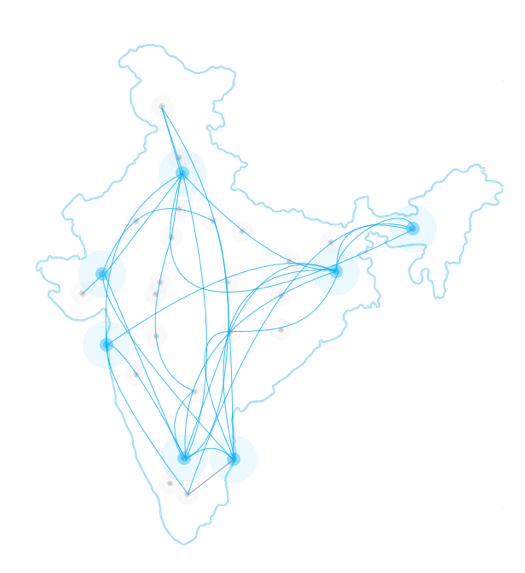North-East, the land of seven sisters, with a population of more than 45 million, is connected by rail and road with the rest of India only through the 22 km-wide Siliguri Corridor. The lack of connectivity through Bangladesh has made accessibility between most parts of the region and mainland India complex and difficult. For example, the distance between Agartala and Kolkata through the Silliguri corridor is three times than through Bangladesh. This is a logistics nightmare, one which even the largest logistics players in India have not been able to address efficiently, and profitably.
So, needless to say, when we met Raghuram Talluri (Raghu) and his team who went out and provided a solution to India’s toughest logistics market first and nailed it while ensuring margins and high service levels, we were all ears!!
The Indian logistics market was estimated at approximately US$ 140 billion in fiscal 2017. However, when one compares India’s logistics expenditure after adjusting for the share of manufacturing/agriculture in GDP and geographic size of the country, logistics in India is around two times less efficient than China and the United States. If we include the impact of inventory cost too, the difference in efficiencies becomes even wider as the transportation time and storage and handling costs in India are significantly higher than the global benchmarks. Why?
India seems to be sandwiched between a growing demand for logistics services on the one end and a fragmented, unorganized logistics services market on the other.
There are many small fragmented LSPs throughout the country (possibly in thousands, according to a recent Avendus report) and most of them cover a small range of pin codes, do not have any technology, cannot offer basic tracking, Proof of Delivery (POD) and recording capabilities, do not have the reach to get business and often run at low levels of utilization. Even the large shippers find it inefficient and expensive to cover large parts of the country through dedicated capacity, because of low utilization and demand variability.
And that’s where Loadshare steps in. The Bengaluru based start-up is building a tech-enabled, asset light, logistics network that connects these two stakeholders- small logistics providers and shippers- to bring in efficiency to this system.
For the small logistics companies, with anywhere from a team of 10 delivery people to a few 100s and who do not have technology resources themselves, Loadshare offers a SaaS based solution to optimise and efficiently scale their business, even outside of their own logistics reach and generates additional demand and revenue from the large shippers.
This way, the LSP expands its reach outside its own logistics network and shippers and large LSPs get a deeper reach and superior customer experience at a lower cost.
The ultimate vision is to have a network of small and medium logistics service providers that can service any shipper for any combination of needs including reach, cost, and quality through orchestration of this network – both in B2B as well as B2C businesses.
Growing from a small base of pin codes in the North East in early 2017, Loadshare has rapidly scaled to cover more than 3000 pin codes, and currently partners with nearly 100 partners throughout the country, both in metros as well as in tier 2 and tier 3 markets. At the same time they have some of India’s most valuable shippers as their clients, reinforcing our belief in the value proposition and ability of this start-up to execute.
We strongly believe that with increasing urbanization, and consumerism due to higher per capita incomes, favourable regulatory changes, and incentives from the government for infrastructure investment, India is at the cusp of a logistics transformation, and we are looking forward to this ride with Loadshare.
Lucky for us, the founding team at Loadshare was a match made in heaven. While Raghu gets his strong business acumen and customer obsession having spent more than seven years in McKinsey, India and then a brief stint in Myntra, complimenting him, Tanmoy and Rakib hold more than 20 years of joint experience in logistics and have successfully started and scaled a last mile logistics hardware company. The founders were recently joined by Pramod, a serial entrepreneur and most recently VP Engg at Snapdeal.
During our interactions what we particularly loved about the team was their hands on problem solving approach and detail – oriented disposition with an old economics thinking of staying profitable (who doesn’t like that)!
And while we promise to “share the load” with the team and partner in this journey, we look forward to meeting more such transformative and disruptive logistics start-ups in the future!

